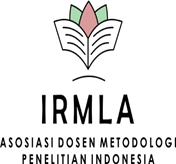THE EFFECT OF BLENDED LEARNING ON STUDENT’S SELF EFFICACY IN MATHEMATIS LEARNING
Abstract
This research aims to find out whether there is a significant influence from blended learning on students' self-efficacy in learning mathematics. This type of research is quantitative research. The instruments used are tests and questionnaires. The questionnaire distributed to the sample was tested for feasibility using validity and reliability tests. The data analysis technique in this research uses simple linear regression analysis, which aims to see the effect of blended learning on students' self-efficacy in learning mathematics. The research subjects were 95 students of SMK Sandhy Putra – 2 Medan, obtained through random sampling techniques and the Slovin method. The results of the research show that there is an influence of the blended learning model on students' self-efficacy in mathematics learning, with the influence of blended learning on students' self-efficacy of 65.8%.
Keywords
Full Text:
PDFReferences
Bandura, A., & Wessels, S. (1994).Self-efficacy(Vol. 4). Academic Press.
Bartimote-Aufflick, K., Bridgeman, A., Walker, R., Sharma, M., & Smith, L. (2016). The study, evaluation, and improvement of university student self-efficacy. Studies in Higher Education,41(11), 1918–1942.
Bonk, C. J., &Graham, C. R. (2015). The Handbook of Blended learning: Global Perspectives, Local Designs.Education Review,0(0).https://doi.org/10.14507/er.v0.818.
Darma, I. K., Karma, I. G. M., & Santiana, I. M. A. (2020). Blended learning, inovasi strategi pembelajaran matematika di era revolusi industri 4.0 bagi pendidikan tinggi. PRISMA, Prosiding Seminar Nasional Matematika,3, 527–539.
Doo, M. Y., Bonk, C. J., & Heo, H. (2023). Examinations of the relationships between selfefficacy, self-regulation, teaching, cognitive presences, and learning engagement during COVID-19. Educational technology research and development, 71(2), 481–504. https://doi.org/10.1007/s11423-023-10187-3.
Ghufron, M. N., & Suminta, R. R. (2013). Self-efficacy dan hasil belajar matematika: Metaanalisis.Buletin Psikologi,21(1), 20–30.
Haeruman, L. D., Wijayanti, D. A., & Meidianingsih, Q. (2021). Efektivitas Blended learning Berbasis LMS dalam Pembelajaran Matematika. Jurnal Riset Pembelajaran Matematika Sekolah,5(1), 80–84.
Hartati, I., Suciati, I., & Wahyuni, D. S. (2021). Pengaruh Self-efficacy Terhadap Hasil Belajar Matematika Meta Analisis. Guru Tua: Jurnal Pendidikan Dan Pembelajaran, 4(2), 49– 56.
Indrayany, E. S., & Lestari, F. (2021). Penerapan Pembelajaran Blended learning untuk Meningkatkan Keaktifan Belajar Mandiri Siswa Kelas VII SMP pada Materi Perbandingan.DIKSI: Jurnal Kajian Pendidikan dan Sosial,2(2), 68–76.
Jazuli, M., Arianto, F., & Maureen, I. Y. (2022). Pengaruh Blended learning Terhadap Selfefficacy Peserta Didik dalam Pembelajaran Geografi di Madrasah Aliyah Negeri 1 Mojokerto.Jurnal Ilmiah Mandala Education,8(2).
Khilmi R, N. (2018). Pengaruh Blended learning terhadap Kemampuan Representasi Matematis dan Self Efficacy Siswa.Journal of Mathematics Education, 4(2).
Kurniawati, M., Santana Purba, H., & Kusumawati, E. (2019). Penerapan Blended Learning Menggunakan Model Flipped Classroom Berbantuan Google Classroom Dalam Pembelajaran Matematika SMP.
Mukti, B., & Tentama, F. (2019). Faktor-faktor yang mempengaruhi self-efficacy akademik. Prosiding Seminar Nasional Magister Psikologi Universitas Ahmad Dahlan, 341–347.
Negara, H. R. P., Nurlaelah, E., Herman, T., & Tamur, M. (2021). Mathematics self efficacy and mathematics performance in online learning. Journal of Physics: Conference Series,1882(1), 012050.
Ningsih, W. F., & Hayati, I. R. (2020). Dampak Self-efficacy Terhadap Proses & Hasil Belajar Matematika (The Impact Of Self-Efficacy On Mathematics Learning Processes and Outcomes).Journal on Teacher Education,1(2), 26–32.
Riasari, D. (2018). Peranan model pembelajaran matematika berbasis blended learning terhadap komunikasi matematis siswa dalam materi statistik pada sman 1 tapung. Jurnal Pendidikan Tambusai,2(2), 813–820.
Schwarzer, R., & Luszczynska, A. (2008). Self efficacy. Handbook of Positive Psychology Assessment, 207–217.
Sharma, P. (2010).Blended learning.ELT Journal,6(4).
Singh, H. (2021). Building effective blended learning programs. Dalam Challenges and opportunities for the global implementation of e-learning frameworks (hlm. 15–23). IGI Global.
Suciono, W. (2021). Berpikir kritis (tinjauan melalui kemandirian belajar, kemampuan akademik dan self-efficacy). Penerbit Adab.
van Dinther, M., Dochy, F., & Segers, M. (2011). Factors affecting students’ self-efficacy in higher education. Educational Research Review, 6(2), 95–108. https://doi.org/https://doi.org/10.1016/j.edurev.2010.10.003.
Widyaninggar, A. A. (2015). Pengaruh self-efficacy dan lokus kendali (locus of control) terhadap prestasi belajar matematika.Formatif: Jurnal Ilmiah Pendidikan MIPA,4(2).
Wijaya, A. P., Rumite, W., & Marpaung, R. R. (2019). Minat Siswa Terhadap Matematika Dan Hubungannya Dengan Metode Pembelajaran Dan Self-efficacy. Jurnal Pendidikan Matematika,13(1), 83–100.
Zagoto, S. F. L. (2019). Self-efficacy dalam proses pembelajaran. Jurnal Review Pendidikan dan Pengajaran (JRPP),2(2), 386–391.
DOI: https://doi.org/10.30596/jmes.v5i1.18573
Refbacks
- There are currently no refbacks.
This work is licensed under a Creative Commons Attribution-NonCommercial-ShareAlike 4.0 International License.


.png)



